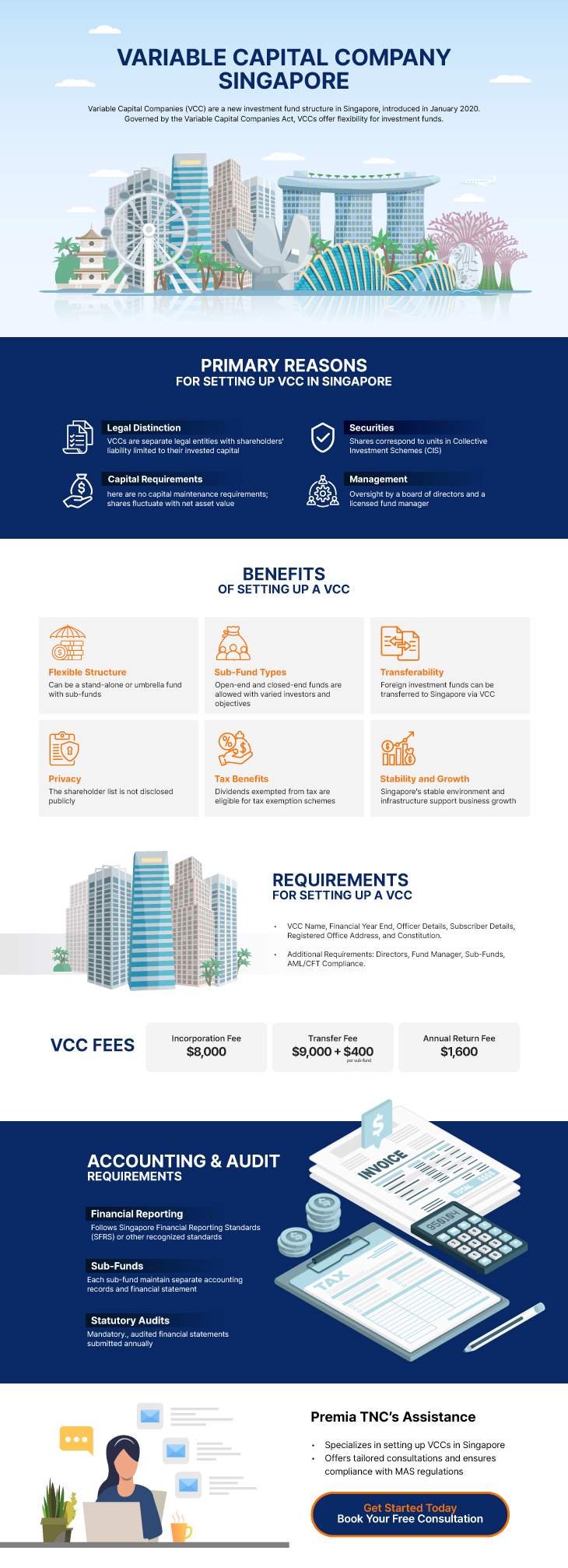
Despite being one of Asia’s main financial hubs, Singapore continues to push for growth in various industries, including asset management. With its reputation and transparent governance, the country has long been appealing to entrepreneurs and investors alike. In a bid to attract more fund managers, the VCC was introduced in January 2020 as a flexible investment fund structure providing a wider range of use.
What is a VCC?
VCC stands for Variable Capital Companies, which is a fairly new type of Singapore corporate structure for investment funds. It is governed by the Variable Capital Companies Act and functions as an additional option to other investment fund structures in Singapore such as trust structures under private limited companies and limited partnerships.

Strategy with a VCC!
Take advantage of flexible capital and asset protection.
Core reasons for setting up VCC in Singapore
Legal
A Variable Capital Company (VCC) is considered a distinct legal entity capable of owning property in its own name, separate from its shareholders and directors. While a sub-fund under an umbrella VCC is not a separate legal entity, the VCC can litigate on behalf of a sub-fund as if it were, and legally, a sub-fund’s assets are treated as belonging to a separate entity. VCCs are exclusively intended for collective investment schemes (CIS), serving as a vehicle solely for this purpose.
Shareholders liability
Shareholders’ liability in a VCC or its sub-funds is limited to any unpaid portion of their share purchase, as they bear no further liabilities beyond their invested capital.
Securities
VCC shares correspond to units in a CIS, with shareholders akin to unitholders. Shareholders possess rights to profits from the VCC’s property as outlined in the constitution, including participation in or receipt of payments from the VCC’s assets or those of its sub-funds.
Capital requirements
VCCs have no capital maintenance requirements and must issue at least one share. Shares lack a par value, ensuring alignment with the VCC’s net asset value. The share price fluctuates in tandem with asset value, determined by total net asset value divided by total shares outstanding.
Management of the VCC
The VCC is overseen by its board of directors, necessitating at least one director. If the VCC includes at least one authorized scheme, three directors are required, one of whom must be independent. Additionally, a fund manager holding a Capital Markets Services License for fund management is mandatory to manage the VCC’s assets or operate its CIS or schemes.
What are the benefits of setting up a VCC in Singapore?
With the establishment of rising numbers of VCCs in Singapore, it is quickly becoming a familiar structure which has increased investors’ confidence in the platform. Please find the below information and benefits:
VCC Type
The VCC can be set up either as a stand-alone fund or an umbrella fund with several sub-funds. If the VCC had initially been set up as a stand-alone fund, the option to switch to an umbrella VCC is always available as long as ACRA is notified within 14 days of the change.
This key aspect of the VCC structure, from which it earns its name, allows the issuance and redemption of shares without shareholders’ approvals, and the payment of dividends from its capital, providing considerable ease for investors to move their investments.
Sub-fund Types
For umbrella VCCs, both open-end and closed-end fund types can be used under the same structure, allowing greater flexibility, operational efficiency and cost benefits. There are also no restrictions for the sub-funds to have the same investors or investment objectives.
Transferability
Fund managers can choose to transfer the registration of comparable foreign investment funds to Singapore using a VCC instead of setting up a new one. Currently, only a one-to-one transfer is possible, but this could change in the future.
Privacy
The VCC’s shareholder list does not have to be disclosed to the public. This affords a level of privacy for VCCs which cannot be enjoyed by a typical company structure. However, the updated register of members (i.e. shareholders) must be maintained internally and made available to authorities if required.
VCC Grant Scheme
A qualifying fund manager setting up a VCC or re-domiciling an existing foreign entity for the first time can receive funding under the extended Variable Capital Companies Grant Scheme (VCCGS). This scheme initially set to expire on 15 January 2023, has been extended for a period of two years until 15 January 2025.
Tax Benefits
As with any other dividends paid by a Singapore company to its shareholders, the dividends paid out by Singapore VCCs are also exempted from tax. In addition, the start-up tax exemption scheme and the partial tax exemption scheme for Singapore companies are applicable to VCCs as well.
Stability and Growth
Singapore is renowned for its well-developed infrastructure, political stability, business-friendly environment, skilled workforce and global connections, making it one of the best countries in the world to start a business. These same benefits apply to the setting up of a VCC. In addition, MAS is revisiting the VCC structure to see how it can increase its attractiveness. Singapore can expect to see improvements to the structure in the next few years.
What are the requirements for setting up a VCC?
Similar to a private limited company in Singapore, VCCs need to have the following information/documents ready for incorporation:
- VCC Name
- Financial Year End
- Particulars of VCC Officers with at least 1 resident director and resident company secretary
- Details of Subscriber(s)
- Local Registered Office Address
- Constitution
The following are also additional requirements for the VCC structure:
Directors
Besides the resident director stated above, there must be at least 1 director who is a qualified representative or director of the VCC’s fund manager. This can be the same person as the resident director. Additionally, if the VCC has Authorised Schemes (i.e. collective investment schemes or CIS), a minimum of 3 directors is required with 1 of them being an independent director. An independent director refers to one who is not connected to the VCC in any way other than in the capacity of a working director.
Fund Manager
The VCC needs to appoint a fund management company that is licensed or registered, or an exempted financial institution to manage their assets. At the point of incorporation, the following information/documents from the Singapore-based fund manager must be ready for submission:
- Unique Entity Number (UEN)
- Full Name
- Address of Principal Place of Business
- Country of Incorporation
- Declaration by Fund Manager
Sub-Funds
If the VCC is an umbrella VCC, its sub-fund will need to be registered with ACRA within 7 days of its formation. The following information is required for registration:
- Sub-Fund Name
- Date of Formation
AML/CFT
VCCs must abide by the requirements from MAS on anti-money laundering (AML) and countering the financing of terrorism (CFT) and are expected to have in place a robust system with due diligence measures and other controls to detect and deter the flow of related funds. All information collected and transactions recorded have to be maintained for availability to authorities if required.
VCC Fees
The ACRA fees for a VCC are much higher than that of a private limited company. Below are some of the application/submission fees in relation to VCCs and sub-funds.
- Name Registration: $15
- Incorporation: $8,000
- Certificate Confirming Incorporation of VCC: $50
- Transfer of Registration: $9,000 + $400 (sub-fund registration) x No. of sub-funds
- Sub-fund Registration: $400
- Change in VCC or sub-fund name: $15
- Annual Return: $1,600

Profit with a VCC in Singapore!
Leverage VCC-specific tax exemptions and incentives to maximize your returns.
What are the accounting and audit requirements for a VCC?
The same accounting requirements for a private limited company apply to VCCs. However, since its structure differs from that of a normal company, here are some points to take note of.
Financial Reporting Standards
Besides the Singapore Financial Reporting Standards (SFRS), a VCC can also choose to use other internationally recognised accounting standards such as the International Financial Reporting Standards (IFRS) or US Generally Accepted Accounting Principles (US GAAP) while preparing its financial statements.
Sub-Funds
Each sub-fund under an umbrella VCC is required to have its own accounting records and financial statements, even though only a single annual return is to be filed under the umbrella VCC with its full set of financial statements. All sub-funds under the umbrella VCC are also required to have the same accounting period.
Although sub-funds will each have a unique sub-fund number, they do not have separate legal identities but must have segregated assets and liabilities. This is to protect the interests of investors from different sub-funds as the liabilities of one sub-fund cannot be discharged by the assets of another sub-fund.
Statutory Audits
Unlike private limited companies, VCCs cannot be exempted from audits. Therefore, an auditor must be appointed within 3 months of incorporation and audited financial statements must be submitted during the annual return filing for each financial year.
Premia TNC’s Assistance
Premia TNC specializes in facilitating the establishment of Variable Capital Companies (VCCs) in Singapore. Our experienced team offers comprehensive support, including tailored consultations to align VCC structures with your business objectives, and ensuring strict adherence to all regulatory compliance standards set by the Monetary Authority of Singapore (MAS).
Frequently Asked Questions
1. Who can incorporate a Singapore VCC?
You may engage the services of a registered filing agent to file the VCC incorporation. Alternatively, a subscriber of the VCC can also submit the application via the VCC portal.
2. What is a subscriber in relation to a VCC?
A subscriber (or subscribers) is an initial shareholder of the VCC upon its incorporation whose name (or names) appear in the VCC’s constitution. This can be either an individual person or a corporate entity.
3. How many shareholders can a VCC have?
VCCs must have at least 1 shareholder with no maximum number.
4. Is there a minimum capital requirement for VCCs?
VCCs need to issue at least 1 share but there has been no minimum capital requirement imposed.
5. How are VCC shares prices determined at the point of issuance, redemption or repurchase?
The actual value of a VCC’s paid-up capital is always equal to its net asset value. Therefore, as its net asset value changes, its share price changes and is calculated proportionately based on the number of shares at that point in time.






















